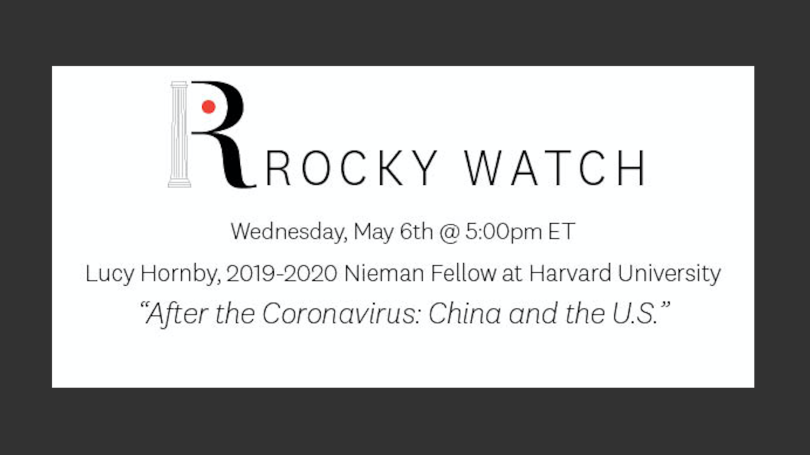
- Public Policy
- Leadership
- Funding
- News & Events
- About the Center
Back to Top Nav
Back to Top Nav
Back to Top Nav
Back to Top Nav
On Wednesday, May 6th, 2020 Nieman Fellow and former Financial Times deputy bureau chief in Beijing, Lucy Hornby, spoke with Dartmouth students and community members at the Rockefeller Center’s fifth Rocky Watch event of the spring term. Rocky Watch is a weekly series of live broadcasts that the Center hopes will foster a virtual common space for community discussion in this time of social distancing and remote learning.
Hornby lived in China for about 20 years, first moving there to teach English in Wuhan before transitioning to journalism. During her time in China, she worked at both Reuters and the Financial Times. Her lecture focused on how COVID-19 has impacted China’s international standing.
First, Hornby observed that even before the coronavirus swept over the world, China had changed drastically from when she moved there in the 1990s. Before she left China last year, it was clear that in many ways China had “closed the gap with the U.S.” It possessed modern infrastructure, its technology sector was booming, and its influence was expanding around the globe. However, according to Hornby, the U.S. enjoyed one critical edge over China: “China still admired U.S. governance.” That, along with much else, has changed in the era of the coronavirus.
There are four main areas in which Hornby sees the coronavirus impacting China’s position in world affairs. The first is ideology. Initially, it looked as though the coronavirus pandemic, which originated in Wuhan, would undermine the domestic and global image of China’s authoritarian government. However, the aggressive lockdowns imposed by China in January and February contained the virus by March. In the meantime, the virus spread outside of China and hit the Western democracies even harder. China’s more effective response to the virus has lent “credibility to the responses of the authoritarian governments,” representing a major ideological victory for the Chinese.
Second, the coronavirus has thus far improved China’s geopolitical position. Because China was already well on its way to overcoming the coronavirus by the time it hit the rest of the world, China was able to lend expertise and protective gear to COVID-impacted countries as part of a strategy known as “Mask Diplomacy.” Hornby says that this aid is having an especially large impact in Europe, where “Eastern and Southern Europe have been for some time peeling away from the EU and NATO.” Chinese aid to these regions, especially when contrasted with the absence of help from Western Europe and the United States, is causing countries like Serbia, Hungary, and Italy to gravitate away from the West and towards China’s sphere of influence. Although “it’s not always clear that the aid or the masks [China is] offering is greater” than what was given to China at the outset of its coronavirus outbreak, “Mask Diplomacy” is clearly benefiting China’s geopolitical position.
Third, the coronavirus has demonstrated and expanded China’s sway over international institutions. “The WHO wasn’t actually allowed into China” during the initial stages of the coronavirus crisis, Hornby says, but in spite of that the organization largely parroted Chinese claims that the outbreak was under control. The WHO’s anemic oversight of China’s response to the virus demonstrates the influence that China already had with the international body. However, according to Hornby, this influence has been further amplified by the Trump Administration’s decision to withdraw from the WHO. In terms of their responsiveness to U.S. interests, “international institutions have been undermined by China,” Hornby surmises.
Hornby argues that China’s greater sway over international institutions holds great significance for the United States. Since the end of World War II, the U.S. has relied on international institutions “to promote the kind of governing system that we’ve come to take for granted.” Ceding these crucial forums of global governance to authoritarian regimes like China holds alarming implications for U.S. global leadership and the state of worldwide democracy.
Fourth and finally, Hornby predicts that the coronavirus crisis will cause companies around the world to question their China-centric supply chains. “For decades, U.S. corporations have had a strategy of offshoring [frequently to China],” Hornby says. However, the coronavirus has highlighted the national security risks that such a strategy entails, namely, that it puts U.S. companies at the mercy of the domestic stability of their host countries. According to Hornby, as the coronavirus rages “that dependence has been brought home to many Americans.” Thus, the coronavirus could lead to corporations diversifying their supply chains away from China to avoid, so to speak, putting all of their eggs in one basket.
Aggregating these points, Hornby believes that the coronavirus has “been a boon for China,” and she leaves the Rockefeller Center with a note of caution. While China has been undeniably successful in containing the coronavirus, “the degree of control that China has needed” in order to do this is extreme. China must consider whether that need for control is tenable on a global scale, and the world must decide whether it wants to be on the receiving end of it.
-Written by Ben Vagle ’22, Rockefeller Center Student Program Assistant for Public Programs
Rocky Talk Podcast w/ Lucy Hornby: Apple Podcasts and Spotify.